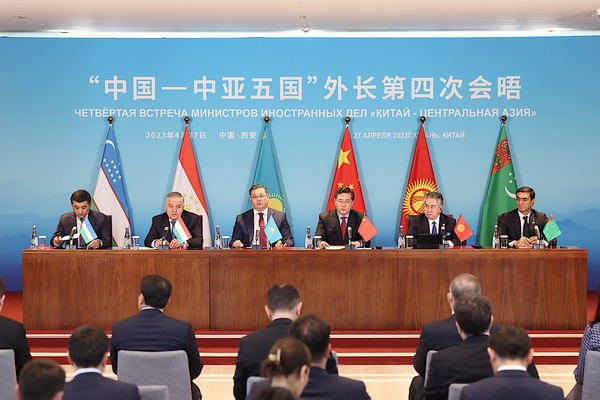
On April 27, 2023, State Councilor and Foreign Minister Qin Gang briefed journalists on relevant situations after chairing the fourth China-Central Asia Foreign Ministers' Meeting in Xi’an.
Qin Gang said that the fourth China-Central Asia Foreign Ministers’ Meeting has made comprehensive political preparations for the upcoming China-Central Asia Summit, and the two sides exchanged in-depth views on cooperation between China and Central Asian countries and issues of mutual interest and concern, with a wide range of consensus reached.
First, adhere to good-neighborliness and friendship, and work together to ensure the success of the Xi’an Summit. All parties have agreed to host China-Central Asia Summit in Xi’an next month. This is an important step taken by all the parties to build with resolution a closer community with a shared future between China and Central Asia for the future of the six countries and their people. All the parties will work with concerted efforts to host a splendid event, present the high-level China-Central Asia cooperation to the world, and usher China-Central Asia relations into a new era.
Second, adhere to solidarity and mutual assistance, and enhance mutual support. All parties reiterated their respect for respective choice of a development path suited to their own national conditions, firm mutual support on issues concerning each other’s core interests, stern opposition to external interference in internal affairs, and resolute rejection of any individual or any force creating chaos and turbulence in Central Asia. The Chinese government firmly supports the sovereignty, independence, security and territorial integrity of Central Asian countries. This position has never changed and will not change.
Third, adhere to mutual benefit and win-win results, and advance high-quality Belt and Road cooperation. All parties spoke highly of the achievements of Belt and Road cooperation between China and Central Asian countries over the past ten years, and said that they will further increase the level of economic, trade, investment and financing cooperation, forge a modern regional connectivity network, promote personnel exchanges, ensure smooth cargo transportation, expand cooperation in such fields as agriculture, new energy, e-commerce, and digital economy, and enhance cultural and people-to-people and sub-national exchanges, so as to further invigorate and substantiate cooperation between the six countries and further contribute to the development and rejuvenation of the six countries.
Fourth, adhere to sharing weal and woe, and expand security cooperation. All parties held the view that currently, the complex and changing situation in Central Asia has brought new challenges to the development of the six countries. The six countries are resolute in making greater efforts to crack down on the three forces of terrorism, separatism and extremism, illegal drug trafficking, and multinational organized crime and cyber crime, strengthen communication and coordination on the Afghan issue, and jointly safeguard regional peace and tranquility.
Fifth, adhere to fairness and justice, and resolutely safeguard the international order. China and Central Asian countries share the same or similar positions on major international and regional issues, and will keep close collaboration within such multilateral institutions and frameworks as the United Nations (UN) and the Shanghai Cooperation Organization, abide by the purposes and principles of the UN Charter and other recognized norms of international law, practice true multilateralism, and make China-Central Asia contribution to promoting the reform of the global governance system and building a human community with a shared future.
